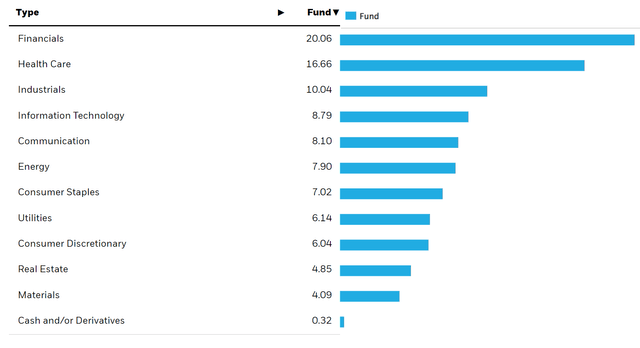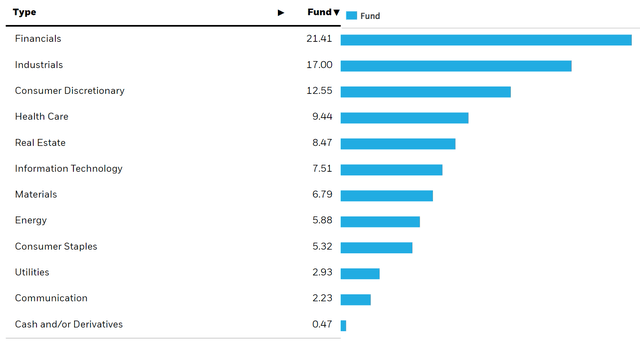syahrir maulana
The iShares S&P Small-Cap 600 Value ETF (NYSEARCA:IJS) is a nice one. Its fees are low, its sectoral allocations are favourable, and all else equal there looks to be a discount factor on account of its small-cap exposures. Small-cap is also maybe a bit of an exaggeration. Lots of the exposures are mid-cap, in the $1 billion – $5 billion range. Overall, there is a margin of safety here against reference yields, and a value proposition relative to comparable ETFs. A buy.
The Comp
The ETF that we think is comparable to is the iShares Russell 1000 Value ETF (IWD), which starts with allocations like Berkshire Hathaway (BRK.A). Allocating at the top of the market stack rather than towards the middle-bottom is the only major difference between the ETFs. Their sectoral distributions are pretty similar, both with a focus on financials.
The order of the next couple are different. IJS has more industrials than healthcare, while in a similar difference of allocations, the IWD focuses on healthcare over industrial. Consumer discretionary features higher than others on the IJS, which granted isn’t the greatest thing given the economic environment. In exchange, IJS has more real estate exposures through REITs.
Comments
Both have more than 20% allocated to financials. This is a major source of resilience for both of them. In the IJS the exposures are more weighted towards regional banking, while the IWD has more balance between banks and financials. Either are fine. Banks are benefiting from higher lending rates and lagging savings rates, while insurance are benefiting from an improving return profile on short-term fixed income instruments which will generate higher yield as they roll over in the reserve portfolio.
Both have decent healthcare exposures. The IWD is at 17% while the IJS is at 10%. The IWD exposures are more typical biopharma and are probably more resilient fundamentally, but the IJS exposures aren’t biotech either. There’s a lot of single-product medtech like Lantheus Holdings (LNTH), but they keep to a value factor as the portfolio name would suggest and ultimately have medical needs as their end-market.
IWD has a 6% consumer discretionary exposure versus the 12% for IJS. This doesn’t play in IJS’ favour as consumer discretionary is one of the most levered sectors to economic downturn. On the other hand IJS has about 8% exposure to real estate to IWD 4% RE exposure, and given the benefits of REITs in a downturn, that’s a swing back towards IJS in terms of resilience factor. IJS also has a 17% industrial exposure versus the 10% for IWD, so the industrial allocations and healthcare allocations are flipped. Industrial is more of a mixed bag due to inflation exposure.
Overall both are large and diversified ETFs with identical 0.18% portfolio fees. Both are also rather cheap, with the IWD trading at a 14x PE and the IJS trading at a 12x PE. There’s about a 15% discount there on the market cap factor, given that the sectoral risks more or less balance out. The IJS offers almost a 10% earnings yield. As reference rates come up ahead of 4%, having an ample risk premium is important, essentially since earnings are under threat from persisting inflation in the interim, and risk of demand slowdown and unemployment from rate hikes. We don’t see too much difference in relative risks between the portfolios, and therefore prefer where earnings yields are higher. IJS looks like a solid ETF exposure.
While we don’t often do macroeconomic opinions, we do occasionally on our marketplace service here on Seeking Alpha, The Value Lab. We focus on long-only value ideas, where we try to find international mispriced equities and target a portfolio yield of about 4%. We’ve done really well for ourselves over the last 5 years, but it took getting our hands dirty in international markets. If you are a value-investor, serious about protecting your wealth, us at the Value Lab might be of inspiration. Give our no-strings-attached free trial a try to see if it’s for you.





Be the first to comment